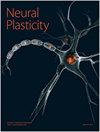小胶质细胞的自噬缺陷加重了反复的社会失败压力诱导的社会回避
IF 3.7
4区 医学
Q2 Medicine
引用次数: 18
摘要
重度抑郁症(MDD)与反复暴露于环境压力有关。自噬在各种应激条件下被激活,这些应激条件与大脑中的几种疾病有关。本研究旨在阐明反复社交失败(RSD)下前额叶皮层(PFC)自噬信号的变化,以探讨小胶质细胞自噬在RSD诱导的行为改变中的作用。我们发现,MDD动物模型RSD应激显著诱导PFC中初始自噬信号,随后自噬相关基因(Atg6、Atg7和Atg12)转录增加。同样,在MDD患者死后的PFC中,atg (Atg6、Atg7、Atg12和Atg5)转录显著增加。抗抑郁小鼠和重度抑郁症患者的前额叶皮质LC3B蛋白水平显著升高,而p62蛋白水平显著降低,而易感小鼠和重度抑郁症患者的p62蛋白水平则无显著降低。这表明增强的自噬通量可能减轻应激性抑郁。此外,我们发现FKBP5,一种早期自噬调节因子,在弹性小鼠的PFC中转录物和蛋白水平显著增加。此外,弹性小鼠前额皮质小胶质细胞的自噬通量增强,小胶质细胞自噬不足加剧了rsd诱导的社交回避,表明小胶质细胞自噬涉及应激诱导的行为改变。本文章由计算机程序翻译,如有差异,请以英文原文为准。
Deficient Autophagy in Microglia Aggravates Repeated Social Defeat Stress-Induced Social Avoidance
Major depressive disorder (MDD) is associated with repeated exposure to environmental stress. Autophagy is activated under various stress conditions that are associated with several diseases in the brain. This study was aimed at elucidating the autophagy signaling changes in the prefrontal cortex (PFC) under repeated social defeat (RSD) to investigate the involvement of microglial autophagy in RSD-induced behavioral changes. We found that RSD stress, an animal model of MDD, significantly induced initial autophagic signals followed by increased transcription of autophagy-related genes (Atg6, Atg7, and Atg12) in the PFC. Similarly, significantly increased transcripts of ATGs (Atg6, Atg7, Atg12, and Atg5) were confirmed in the postmortem PFC of patients with MDD. The protein levels of the prefrontal cortical LC3B were significantly increased, whereas p62 was significantly decreased in the resilient but not in susceptible mice and patients with MDD. This indicates that enhanced autophagic flux may alleviate stress-induced depression. Furthermore, we identified that FKBP5, an early-stage autophagy regulator, was significantly increased in the PFC of resilient mice at the transcript and protein levels. In addition, the resilient mice exhibited enhanced autophagic flux in the prefrontal cortical microglia, and the autophagic deficiency in microglia aggravated RSD-induced social avoidance, indicating that microglial autophagy involves stress-induced behavioral changes.
求助全文
通过发布文献求助,成功后即可免费获取论文全文。
去求助
来源期刊

Neural Plasticity
Neuroscience-Neurology
CiteScore
5.70
自引率
0.00%
发文量
0
审稿时长
1 months
期刊介绍:
Neural Plasticity is an international, interdisciplinary journal dedicated to the publication of articles related to all aspects of neural plasticity, with special emphasis on its functional significance as reflected in behavior and in psychopathology. Neural Plasticity publishes research and review articles from the entire range of relevant disciplines, including basic neuroscience, behavioral neuroscience, cognitive neuroscience, biological psychology, and biological psychiatry.
 求助内容:
求助内容: 应助结果提醒方式:
应助结果提醒方式:


